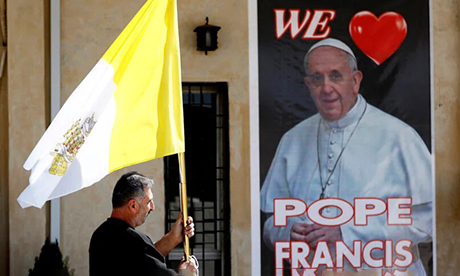According to infectious disease experts, the pope’s upcoming trip to Iraq is ‘not a good idea’.
They have expressed concern about a sharp rise in coronavirus infections and a fragile health system in the country.
There is also the unavoidable likelihood that Iraqis will crowd to see him.
No one wants to tell Pope Francis to call off the trip. And the Iraqi government has every interest in showing off its relative stability by welcoming the first pope to the birthplace of Abraham.
The March 5-8 trip is expected to provide a sorely-needed spiritual boost to Iraq’s beleaguered Christians.
It will also further the Vatican’s bridge-building efforts with the Muslim world.
But from a purely epidemiological standpoint, as well as the public health message it sends, a papal trip to Iraq amid a global pandemic is not advisable, health experts say.
Vatican ambassador to Iraq tests positive for COVID
Their concerns were reinforced with the news Sunday that the Vatican ambassador to Iraq tested positive for COVID-19 and was self-isolating.
He is the main point person for the trip and would have escorted Francis to all his appointments.
In an email to The Associated Press, the embassy said Archbishop Mitja Leskovar’s symptoms were mild and that he was continuing to prepare for Francis’ visit.
“I just don’t think the visit is a good idea,” said Dr. Navid Madani, virologist and founding director of the Center for Science Health Education in the Middle East and North Africa at Harvard Medical School’s Dana-Farber Cancer Institute.
The Iranian-born Madani co-authored an article in The Lancet last year on the region’s uneven response to COVID-19. It noted that Iraq, Syria and Yemen were poorly placed to cope. They are still struggling with extremist insurgencies and have 40 million people who need humanitarian aid.
Madani said Middle Easterners are known for their hospitality.
He cautioned that the enthusiasm among Iraqis of welcoming a peace-maker like Francis to a neglected, war-torn part of the world might lead to inadvertent violations of virus control measures.
“This could potentially lead to unsafe or superspreading risks,” she said.
Dr. Bharat Pankhania, an infectious disease control expert at the University of Exeter College of Medicine, concurred.
“It’s a perfect storm for generating lots of cases which you won’t be able to deal with,” he said.
Sources
